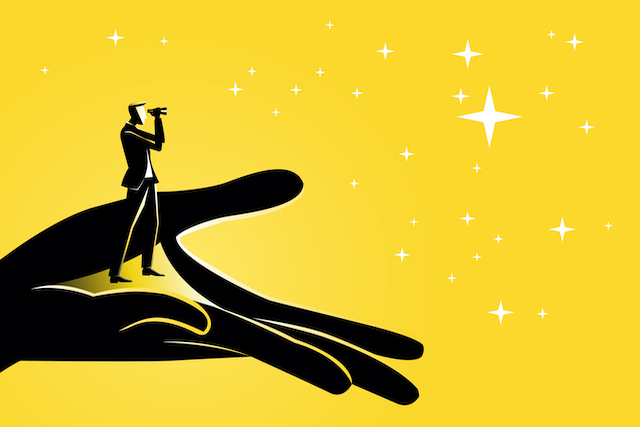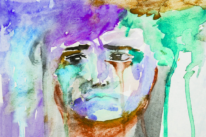
“We must be willing to let go of the life we planned so as to have the life that is waiting for us.” ~Joseph Campbell
From as far back as I can remember, I was enchanted with music. One of my earliest memories is of circling a record player while listening to a 45 rpm of Simon & Garfunkel’s “Mrs. Robinson.” I made my public singing debut in the third grade, performing Kenny Rogers’ mega-hit “The Gambler.” I sang it a cappella at a school assembly, even though I technically didn’t know all the words.
At home, I devoured my dad’s records and tapes (pop, show tunes, classical, “oldies”), and started building my own collection at the age of nine (early ‘80s Top 40, and hard rock). For fun, I made up my own bits and pieces of songs and wrote the lyrics down in a notebook.
After much begging, I finally got my hands on a guitar at the age of thirteen and began lessons. Having discovered The Beatles a year or so before, music became nothing short of an all-out obsession. I practiced relentlessly, paying for my lessons with a job I took at a local record store at the ripe young age of fourteen (I was in there so often they eventually hired me), and within a couple of years began my first serious attempts at songwriting.
My musical heroes provided such joy, comfort, catharsis, and inspiration during my teenage years that it was only natural for me to emulate them and develop an overwhelming desire to have a music career of my own. Performing for my peers in social situations tended to generate lots of positive attention, which fed my already ravenous appetite to succeed that much more.
Music also became, for me, a way to mitigate the typical insecurities that come with being a young person.
In college, I would habitually wander around the dorm with my guitar and offer spontaneous concerts for anyone who would listen. It was a great way to test out new material and connect with others, and few things in life gave me as much pleasure as singing and playing.
I recall a coffeehouse gig I played on campus that received such a positive response, there was simply no turning back. Being so appreciated for doing something I already loved to do was a euphoric high, so I sought out performing opportunities—formal and informal—even more compulsively.
Somewhere along the line, music and entertaining became not just my passion, but the thing that made me feel worthwhile. The guitar was like a superpower—with it, I could be wonderful. Without it, I was insignificant.
After college, I moved to Nashville—a mecca for songwriters of all stripes—and dove headfirst into the music scene. I lived frugally, worked whatever day jobs I needed to, and spent the bulk of my energy on making music and attempting to get a career off the ground.
I wrote new songs, performed at writer’s nights all over town, and befriended and sometimes shared living quarters with like-minded musicians.
I recorded a studio demo that was rejected or ignored by seventy-five different record companies. But to me, these rejections were simply part of the dues-paying process and made me feel a spiritual kinship with my heroes, all of whom endured similar trials on their way to eventual success.
My closest songwriter friends and I became our own mutual-admiration-and-inspiration society, and helped each other endure the slings and arrows that are par for the course pursuing a career within something as notoriously difficult and fickle as the music industry.
One Sunday morning, I received a call from a DJ who hosted a show on my favorite local radio station, Lightning 100. “What are you doing this evening?” he asked.
Apparently, he liked the demo I had sent him.
To my amazement, that same day I found myself on the 30th floor of the L&C Tower in downtown Nashville with a king-of-the-world view of the city, being interviewed live on the air. The DJ played two of the three songs on my demo over the airwaves during my visit. I shouted gleefully in the car afterward and headed straight over to my closest friends’ apartment (they had been listening from home) to share my giddy excitement with them.
Without record company backing or interest, I ended up financing and overseeing the recording and production of a full-blown studio album myself, while working full-time.
Once the album was complete, I started my own small label to release it, and quit my day job so I could focus full-time on working feverishly to get it heard. I became a one-man record company (and manager and booking agent, to boot), operating out of my bedroom and sending copies of my finished CD (this was the ‘90s) to radio stations, newspapers, and colleges nationwide. I followed up with them by phone (this was still the ‘90s) in the hopes of securing airplay, reviews, and gigs.
I contacted hundreds of colleges and universities—mostly on the east coast where the concentration was highest—to book my own tour.
The idea was to play as many gigs as humanly possible at schools large and small, driving myself from one to the next, selling CDs, and building up a mailing list along the way. This would allow me to eke out a living doing what I loved, in the hopes of gaining greater exposure, building a fan base, and ultimately establishing a bona fide career as a musician/performer.
It was an incredibly exciting time, but also stressful and intense. I did get some airplay on radio stations around the country, and received some reviews of the CD, but not many. I was racking up debt, working obsessively, and putting everything on the line to make my dream a reality. On the practical side, I figured that whatever attention the CD did or did not attract, I would experience life on the road and most likely at least break even, financially speaking.
After months of relentlessly following up with the 182 schools that gave me the green light to send my promotional materials, things were looking increasingly bleak. My points of contact frequently changed hands (and were often students in unpaid roles), and promising deals fell apart.
When all was said and done, I ended up with a single, solitary booking to show for all my efforts. One. This would be the extent of my “tour.”
What I had not anticipated, aside from such dismal results, was the toll this would take on me. I was exhausted in every way imaginable: physically, financially, emotionally, creatively. Most significant, though, was the toll on my spirit. I had believed that if I just worked hard enough, I would succeed, on at least a modest level. These results suggested otherwise.
I never expected, regardless of the rejections I had accumulated, to ever stop trying, as this was the only thing I wanted to do with my life. But now it seemed I had no choice. I could barely get out of bed.
I soon learned that even though I had dutifully kept up with my share of the rent, the housemate I was renting from had apparently not been paying the landlord! A notice I found showed that we were many months delinquent and faced potential eviction at any moment. I needed to find a new place to live. And a new job. All of which would have been a nuisance but doable, had I been my normal self. Alas, I was not. I was a wreck.
On a phone call with my mom, she said, “Why don’t you just come home?”
In what was perhaps the biggest testament to my desperate state, I could not come up with a better option. I moved back into my childhood home—for me, the ultimate concession of defeat.
I had completely lost my way, my direction, my purpose, my drive. A huge part of my self-worth had been tied up in my success—both artistically and commercially—as a musician. I had defined myself by this identity and pursuit. What was I, who was I, without it?
Though I struggled greatly with accepting it, I found that I had no more energy, zero, to invest in my dream. The immediate task at hand was climbing out of depression. And debt.
It took a couple of years before I felt the urge to re-engage with life in ways that reflected my natural enthusiasm. Even then, the desire to resume the pursuit of a music career was gone. But once I started to regain a degree of emotional and financial stability (a boring office job helped this cause tremendously), I took some tentative steps in new directions. I enrolled in a few adult education classes, including an acting class that was quite fun and led to trying my hand at some community theater.
Hiking had been a key factor in my recovery, so I joined the Delaware Valley Chapter of the Appalachian Mountain Club and began hiking with groups of other folks rather than just going out in nature by myself. This led to being invited on my first-ever backpacking trip, which proved to be life-changing and sparked an even greater love of the outdoors.
Feeling better, and finally regaining a sense of possibility for myself, I moved out to California and did a lot more exploring, both inwardly and outwardly.
In the twenty-plus years since, I have done things I never imagined I would do, broadening my palette of interests and life experiences in ways that no doubt would have completely surprised my younger self. I also met an incredible partner and got married.
In other words: I made a life for myself, and became a much happier person, despite never having realized my dream of being a professional musician, nor of even having achieved any notable career success in some other domain.
Though I abandoned my pursuit of music as a livelihood, I never stopped loving music.
Over the years I have performed in a variety of settings, sometimes for pay but more often just for the love of it.
I have shared my passion for music with numerous guitar students, played for hospital patients as a music volunteer, been an enthusiastic small venue concertgoer and fan of ever more artists and styles, continued developing my own skills on guitar and even began taking classical piano lessons.
I will never stop loving music. The difference is that I finally learned to love myself, regardless of any success in the outer world of the music business or lack thereof.
We all, to varying degrees, seek external approval, appreciation, recognition, and validation from others, and it can be momentarily pleasurable to receive these things. Being dependent upon them, however, (not to mention addicted to them!) is a recipe for persistent unhappiness.
The Buddha teaches that all our suffering stems from attachment. While it is perfectly normal and human to desire things, our desires are endless and never satiated for long.
If we make our own happiness or sense of self-worth dependent upon things going a certain way, then we are signing up for misery. The more tightly we cling to our notions of what should be, it seems, the more profound the misery.
The good news, as I have learned, is that life is so large that it does not need to conform to our meager ideas about what can make us contented, happy, or fulfilled. It is large enough to contain our most crushing disappointments and still make room for us to experience meaningful and satisfying lives, often via things we never would have expected nor could have anticipated.
My twenty-something self would likely not have believed it, but I lovingly send this message to him anyway through space and time: It is possible to be happy and live a fulfilling life even if your biggest dream fails to come true. Hang in there! I love you.
About Eric Teplitz
Eric Teplitz is a writer, musician, teacher, and personal coach. He is the creator of the online course Opening to Greater Possibilities. For more information, along with numerous free articles and videos, please visit his website: www.ericteplitz.com.













 Though I run this site, it is not mine. It's ours. It's not about me. It's about us. Your stories and your wisdom are just as meaningful as mine.
Though I run this site, it is not mine. It's ours. It's not about me. It's about us. Your stories and your wisdom are just as meaningful as mine. 